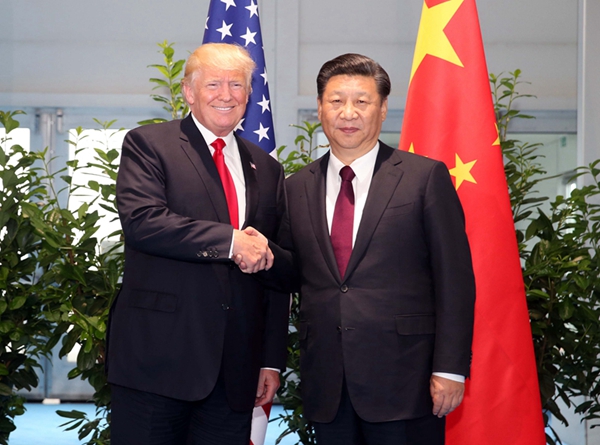US calibrated provocation to China
- By Sajjad Malik
 0 Comment(s)
0 Comment(s) Print
Print E-mail China.org.cn, July 20, 2017
E-mail China.org.cn, July 20, 2017
|
|
|
President Xi Jinping and his US counterpart, Donald Trump, meet on July 8 to discuss bilateral ties and global hot-spot issues on the sidelines of a Group of 20 (G20) summit. [Xinhua] |
Donald Trump might have lowered his anti-China rhetoric after the famed meeting with President Xi Jinping in FlorIda; however, there doesn’t seem to be any deep change in his overall long term policy, including continued American ties with China's Taiwan.
Trump showed his true intentions by accepting a telephone call of the leader of Taiwan after winning the presidential election last November – a first for any U.S. leader. Last month, he displayed his attachment to the old policy by authorizing fresh arms sale to Taiwan.
The latest pro-Taiwanese gesture is the enactment of a law to re-establish regular naval portcalls at Kaohsiung or any other suitable island ports. The provision is part of the National Defense Authorization Act for Fiscal Year 2018, passed by the U.S. House of Representatives last week.
Chinese Foreign Ministry spokesperson Lu Kang said this "seriously violates the one-China policy and the three China-U.S. joint communiqués upheld by the U.S., and infringes on China's domestic affairs."
It was, as China has made clear, against the spirit of cooperation promised by Trump after initial bravado in pledging to "stand up to China."
Beijing is very touchy on Taiwan, which it considers as an integral part of China. It has always opposed any kind of independent military exchanges between other nations and the island.
However, the United States continues to have a tendency to ignore such protests by displaying a policy of hugging Taiwan in a variety of ways.
In June, the State Department approved the sale of arms worth US$1.4 billion to Taiwan. It is the first arms sale deal since Mr. Trump entered the Oval office and negates the entire spirit of the first Trump-Xi meeting.
An angered China called it interference in its domestic affairs while also violating international laws, and urged the Americans to desist.
Instead of taking the Chinese protests seriously, Washington followed up with the ports of call law to further deepen defense cooperation. It can be interpreted as a calculated move to put pressure on China.
Another similar move was the June decision by the U.S. Treasury Department to impose sanctions on a Chinese bank accused of having dealings with North Korea.
Selling arms to Taiwan while showing respect for the one-China policy, and sanctioning a bank while seeking Chinese support to address North Korean issue, shows that the U.S. administration has incorporated purpose-built duplicity in its diplomatic policies.
It wants to continue close cooperation with China, attracted by huge trade and other commercial interests. On the security level, it badly needs Chinese help in dealing with North Korea. Yet, it also wants to assert its right to have an independent track of cooperation with Taiwan.
Other such actions include frequent assertion of the right of free navigation in the South China Sea. It has been sending jets to fly over ships to pass through waters claimed by China. Such steps not only help raise the temperature but are contrary to the policy of seeking good relations.
It shows that there are two strands of U.S. policy towards China. In a short-to- medium timeframe it seeks cooperation, as it cannot afford any kind of tension. We saw how Trump had to moderate his viewsfollowing this approach.
However, the long-term policy objectives are different. The U.S. considers China as rival and has always tried to build ties with regional entities and countries known to be anti-Chinese to varying degrees. Hence, having close links with Taiwan is important in this regard.
Steps like limited arms sale may not lead to any strategic difference, but helps to create reaction and countermeasures that could be detrimental. It is also part of a larger perspective to use Taiwan as a bargaining chip at a critical juncture.
Sajjad Malik is a columnist with China.org.cn. For more information please visit:
http://www.china.org.cn/opinion/SajjadMalik.htm
Opinion articles reflect the views of their authors, not necessarily those of China.org.cn.







Go to Forum >>0 Comment(s)